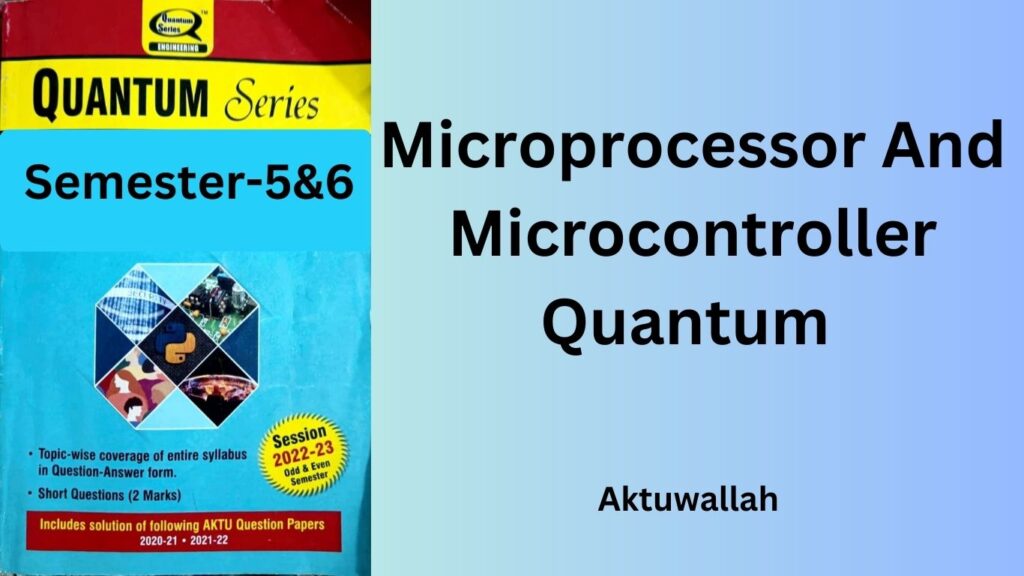Download Microprocessor And Microcontroller Quantum Pdf For Aktu B-tech 3rd Year:
Are you a student pursuing B-Tech from AKTU and looking to download a concise and informative PDF on microprocessors and microcontrollers for your 3rd-year studies? This article will guide you through the process and provide an overview of the key topics covered in the PDF. Let’s delve into the fascinating world of microprocessors and microcontrollers!
How to download Microprocessor And Microcontroller Quantum Pdf for free?
Just click on the following link to download it:
GET PDF
Download other quantum pdf for Aktu B-tech 3rd year: Click Here
Download Aktu Syllabus of B-tech 3rd year: Click Here
Download Handwritten Notes of all subjects: Click Here
Download Microprocessor And Microcontroller PYQs: Click Here
Visit AKTU official site to explore more
Key topics covered in Microprocessor And Microcontroller Quantum Pdf
Table of Contents
- Introduction to Microprocessor And Microcontroller Quantum Pdf
- Understanding the Difference Between Microprocessors and Microcontrollers
- Architecture and Components of Microprocessors
- Architecture and Components of Microcontrollers
- Instruction Set Architecture (ISA)
- Memory Organization and Addressing Modes
- Input/Output (I/O) Interfacing
- Interrupts and Timers
- Serial Communication Protocols
- Analog-to-Digital and Digital-to-Analog Conversion
- Application Areas of Microprocessors and Microcontrollers
- Future Trends and Advancements
- Importance of Microprocessor And Microcontroller Quantum Pdf in AKTU B-Tech 3rd Year Curriculum
- Conclusion
1. Introduction to Microprocessor And Microcontroller Quantum Pdf
Microprocessors and microcontrollers are vital components of modern electronic devices. They are responsible for executing instructions and controlling the operation of various systems. A microprocessor is a programmable-integrated circuit that performs arithmetic, logical, control, and input/output operations. On the other hand, a microcontroller combines a microprocessor with memory and peripherals, making it a self-contained system.
2. Understanding the Difference Between Microprocessors and Microcontrollers
While microprocessors and microcontrollers share similarities, they differ in terms of their applications and functionalities. Microprocessors are commonly used in general-purpose computing devices such as computers, laptops, and smartphones. Microcontrollers, on the other hand, are designed for specific tasks and are prevalent in embedded systems, industrial automation, robotics, and IoT devices.
3. Architecture and Components of Microprocessors
Microprocessors consist of various components, including the arithmetic logic unit (ALU), control unit, registers, and cache memory. They follow the Von Neumann architecture, where the program instructions and data are stored in the same memory.
4. Architecture and Components of Microcontrollers
Microcontrollers integrate a microprocessor core with memory (ROM, RAM, and EEPROM), input/output ports, timers, and serial communication interfaces. This integration allows microcontrollers to perform dedicated tasks efficiently.
5. Instruction Set Architecture (ISA)
The instruction set architecture defines the set of instructions that a microprocessor or microcontroller can execute. It includes operations like data movement, arithmetic and logic operations, branching, and I/O operations.
6. Memory Organization and Addressing Modes
Microprocessors and microcontrollers utilize various memory organization techniques such as stack-based memory, segmented memory, and paging. Addressing modes determine how operands are accessed during instruction execution.
7. Input/Output (I/O) Interfacing
I/O interfacing enables microprocessors and microcontrollers to communicate with external devices such as sensors, actuators, and displays. Common I/O techniques include memory-mapped I/O and I/O-mapped I/O.
8. Interrupts and Timers
Interrupts play a crucial role in handling external events and prioritizing tasks. Timers are essential for generating precise time delays and measuring intervals. Both interrupts and timers enhance the functionality and responsiveness of microprocessors and microcontrollers.
9. Serial Communication Protocols
Serial communication protocols like UART, SPI, and I2C enable data transfer between microprocessors/microcontrollers and peripheral devices. They facilitate communication over short and long distances with multiple devices.
10. Analog-to-Digital and Digital-to-Analog Conversion
Analog-to-digital conversion (ADC) and digital-to-analog conversion (DAC) are essential processes in microprocessors and microcontrollers. ADC converts analog signals into digital data, while DAC performs the reverse operation. These conversions enable interaction with the analog world.
11. Application Areas of Microprocessors and Microcontrollers
Microprocessors and microcontrollers find applications in diverse fields such as automotive systems, consumer electronics, medical devices, home automation, and industrial control systems. Their versatility and scalability make them integral to technological advancements.
12. Future Trends and Advancements
The field of microprocessors and microcontrollers is continuously evolving. Advancements like multicore processors, improved power efficiency, and enhanced connectivity options pave the way for more efficient and intelligent systems. The integration of artificial intelligence and machine learning further expands the potential applications.
13. Importance of Microprocessor And Microcontroller Quantum Pdf in AKTU B-Tech 3rd Year Curriculum
Microprocessors and microcontrollers are fundamental subjects in the AKTU B-Tech 3rd year curriculum. They lay the groundwork for understanding advanced topics like embedded systems, real-time operating systems, and digital signal processing. Proficiency in these areas opens doors to exciting career opportunities in the field of electronics and computer engineering.
15. Conclusion
In conclusion, microprocessors and microcontrollers play a crucial role in modern-day technology. They are essential components of various electronic systems and form a significant part of the AKTU B-Tech 3rd year curriculum. By downloading the Microprocessor And Microcontroller Quantum Pdf on microprocessors and microcontrollers, you can gain valuable insights into their architecture, functionalities, and application areas.
1 thought on “Download Microprocessor And Microcontroller Quantum”